#queer coded literature
Text
I did a thing
check out this blog post!
#dark academia#dark academia aesthetic#dark academia books#todd and neil#anderperry#dead poets society#if we were villains#iwwv#oliver x james#fraternity#literature#the secret history#richard papen#babel#poetry#oscar wilde#queer coded literature#rf kuang#neil perry#john keating#todd anderson#oliver marks
85 notes
·
View notes
Text
simon from lord of the flies is a criminally underrated queercoded character from classic literature. "my poor misguided boy, do you think you know better than I do?" what do you mean by that. "you like ralph a lot don't you?" what do you mean by that. why does he spend all his time frolicking in the forest and enjoying the beauty of nature. why is he stereotypically feminine. why does he break the heteronormative gender roles that the other boys conform to. why does he have religious trauma. why does he become "the beast" in the eyes of the other boys as they follow the growing up allegory. why does he think about ralph smiling at him for so long that he literally crashes into a tree. don't be shy william golding you can tell us
#bonus: why does he randomly reference a female pop culture icon in that one scene. who the fuck is berengaria FAIRY#and before u come at me with 'all of them are kinda gay' THEMATICALLY there is a DIFFERENCE between HOMOEROTICISM and QUEERCODING#bishangzoy#lord of the flies#classic literature#queer coding
233 notes
·
View notes
Text
Can we talk about the found family trope and queer-coded/canonically queer characters? Because there is a ton of overlap between these two.
In their stories, the queer/queer-coded characters no longer have a supportive family for a number of reasons (Hiccup refuses to kill dragons, Johnny wants to be a singer, Nimona is a shapeshifter, etc). A lot of times these reasons are things that ‘other’ them from people around them, thereby furthering the queer allegory.
And this lack of support is what drives these characters to form/find a found family made of more people who are like them. People who will treat them with the love and support that their family should have. It pushes them into the found family trope.
The prevalence of found family in queer and queer-coded story lines serves to make them more relatable and realistic but it’s also heart breaking that familial rejection is so common that this trope does make it more realistic.
#found family#found family things#trope talk#found family is so common in queer literature#and media#queer coding#httyd#toh#percy jackson#sing#sing 2#nimona#avatar the last airbender#avatar the legend of korra#the dragon prince#tlou#supernatural#six of crows#batfam#spiderman#the witcher#the 100#the owl house#how to train your dragon#just something i noticed rewatching nimona again#personal opinion#ao3#fanfiction#amphibia#assassination classroom
362 notes
·
View notes
Text
Galinda's True Colours
One key theme in Wicked is superficiality. The world of Oz is a place where honest conversation is difficult to come by. Almost everyone is pretending to be something, or believe something, or have something, all to get what they want.
Popular approaches this theme with the subtlety of a hyperactive wrecking ball and gives a musical monologue about how this world works, and why.
Because Galinda has been portrayed as ditsy up to this point, with a bit of the self-serving schemer archetype thrown in for flavour. But here, we see just how intelligent she is. Galinda has caught on to how the world works, and understands what buttons to push.
Let me explain.
SPOILERS AHEAD (Wicked)
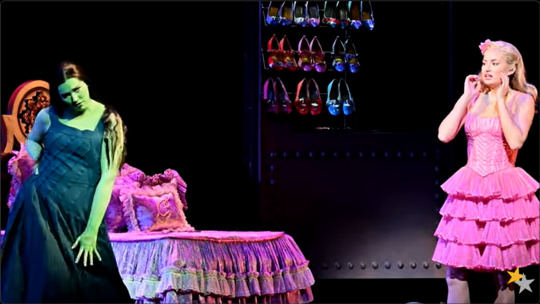
The first element to be brought under examination is Wicked's love for subverting expectations. By this, I mean that certain mindsets in the world have stereotypes associated with them, take idealism and cynicism for example.

From what I have observed, when a writer wants to use one of these archetypes, they will probably draw on a few common ideas. The former is usually portrayed as stary-eyed and naive, or unflinchingly positive. Cynicism meanwhile has a certain sarcasm to it. A cynic might feature a permanent scowl and a dry remark as a kneejerk reaction to anything.
In short, Cynics are usually written to be villains who are overcome by hopeful heroes, or to be heroes who are proven right by a world where hope is meaningless. Idealists on the other hand are either heroes who make the world a better place by sheer force of goodness, or naive fools who the world breaks down.

Obviously, there are exceptions to the rule, but those exceptions are mostly more developed characters in their own right, so the label of "a cynic" doesn't really fit them. Batman is an idealist (when he's written properly).
What is fascinating about Wicked is how the characters are presented. Elphaba is introduced as cynical, she fits the archetype to a tea. But after a musical number, her character swaps entirely. She keeps the sarcasm, but the hopefulness becomes a driving force that goes against the stereotype.
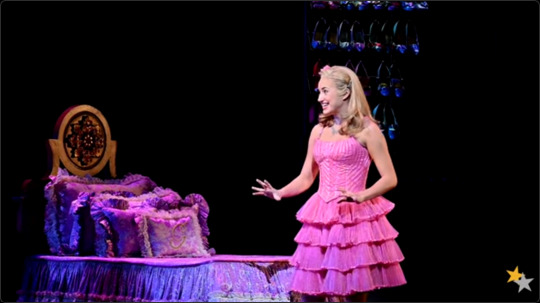
Galinda is... introduced as a bit of a ditz. She's got an ego, she gets what she wants all of the time, she has a well-known family. She's the generic rich kid, essentially. Fiyero gets the same treatment.
For the record, By Galinda, I mean young Glinda, and I am treating them as separate entities until they meet back up.
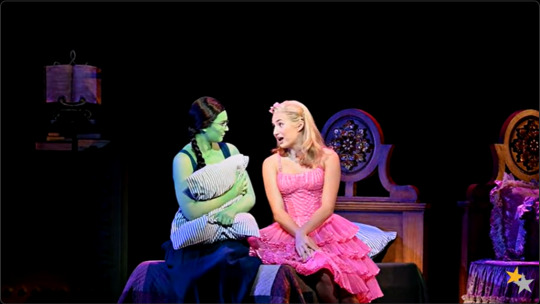
Anyway, when Galinda starts singing, her real worldview becomes clear. It's possible to argue that it wasn't particularly hidden to begin with, but in Popular, she bludgeons you over the head with it.
"Celebrated heads of state
Or 'specially great communicators
Did they have brains or knowledge?
Don't make me laugh!
They were popular!
Please, it's all about popular!
It's not about aptitude
It's the way you're viewed"
As much as I despise it, Galinda is kinda right here.

In 1964, Henry Littlefield published an essay in the American Quarterly titled The Wizard of Oz: Parable on Populism in which he gave some opinions on a theoretical metaphor inherent in The Wonderful Wizard of Oz book (if you don't want to read it, TedEd has a video discussing it and its legacy). He claimed that it was an inherently political book about the time Baum wrote it.
The sparkly new world looks even better if you put on tinted glasses, and only works if you understand that the wizard's power is empty, so Littlefield proposed.
Scholars since have praised, debated, and debunked Littlefield's essay. Pointing out the fact that this is pattern recognition with hindsight, in the same way that you can look to the stars and see a goat.
Essentially, there is an argument for The Wonderful Wizard of Oz being political, and there is an argument (most famously made by its Baum himself) that it is just a children's book.
Wicked is a satire, and not a children's book, so it gets away with some heavy insinuation, but to avoid landmines and a lack of knowledge on my own part, I am going to talk exclusively about how this affects the land of Oz itself, rather than its implications for the real world. Please don't argue in the replies.
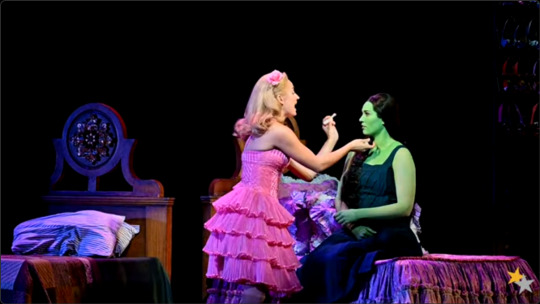
So, Galinda's hypothesis here is that the leaders of Oz do not get to where they are because of any actual skill, but rather because they were well liked by either the people, or their superiors. She gets proven right about this throughout the musical. Madam Morrible moves up in the world by presenting Elphaba to the wizard, the Wizard gained power by giving Oz a common enemy, and Galinda and Fiyero themselves gain status seemingly out of nowhere.
In Oz, it doesn't matter what you know, but who you know, and who knows you.
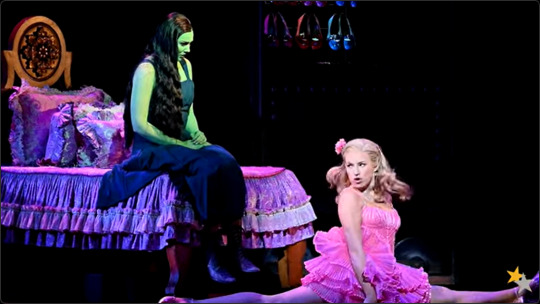
In the show that I watched, Galinda was played by Courtney Monsma, who knocked this number out of the park. Galinda is an incredibly cynical character, but Monsma played her with what I can only describe as "manic pixie energy", which circles back to Wicked's idea of superficiality.
Because the ditzy pantomime of Galinda present in What is this Feeling and half of Dancing Through Life is nothing compared to the madness that is Popular. This is a character who knows exactly how to toss her hair to get what she wants, who knows how to make people think she is something she isn't.
Monsma played a character who was well aware that perception would get her further in life than intelligence, and was having fun with that confidence. But she is actually clever, Galinda has picked up on this fact that everyone else has just accepted subconciously, but now she can explain it.
This song feels like a hyper fixation rant. The frantic obsession was a mere outlet for the excitement of finally being able to speak to this worldview head on to someone who she respects and knows will actually understand her. This song feels like Galinda and Elphaba are on emotional and intellectual equal footing.
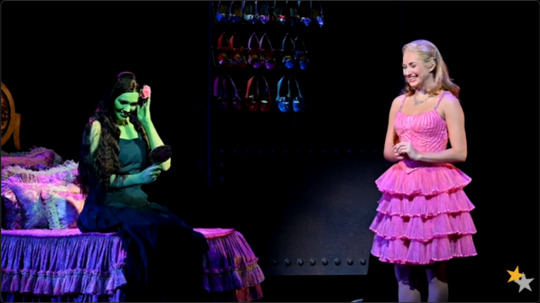
This song is also part of my case for Wicked as a queer musical that only works as a story because the romance doesn't. As in, this is a story about a romance that could have been, and that romance reads as queer to me. I will get more into it next week, but for now, I will say this:
This song doesn't matter, and that's exactly why it does matter.
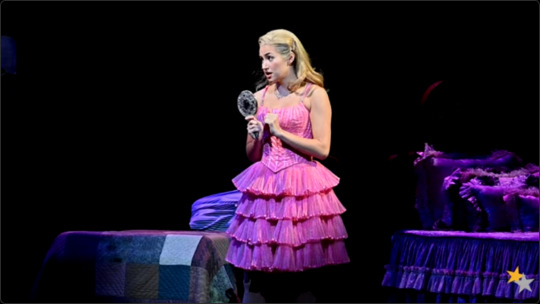
This is the moment when Elphaba and Galinda connect, and share. This is Galinda trying to give back for the wand and make up for her previous behaviour to make Elphaba less of an outcast. But she has already done that.
The moment at the end of Dancing Through Life when Elphaba and Galinda share the spotlight, when Galinda makes herself look like a fool to match Elphaba, when she lets the outcast lead, and the rest of the room goes along with it. That moment is when the romance is kicked off, that is the moment when she starts making amends. That is the moment when she starts to make Elphaba less of a social pariah.
That dance renders Popular superfluous, or at least it does on paper. In reality, this song is doing a lot of heavy lifting in the foreshadowing department, even more so than What is this Feeling, in my most humble of opinions.

Popular happens because Galinda is right about so much in her world, but wrong about the most important thing. Brains and knowledge are irrelevant in Oz, perception is powerful, but empathy rules them all.
Galinda gives this big show of how amazing she is for helping people. Look at her, she's so good. But, Elphaba doesn't care about that, and Galinda does. The romance doesn't work in the end because Galinda realises too late that in the big scheme of things, superficiality is nowhere near as fulfilling as connection. That's why her romance with Fiyero breaks off, and its why her romance with Elphaba is doomed. She only realises this when both options are off the table.
The romance between Elphaba and Galinda breaks apart, but it can only do that because it was there to begin with. You can't tear down nothing.
You could read the relationship as entirely platonic, a friendship that breaks down. But art is subjective, and to me, the romance makes this story so much more compelling.
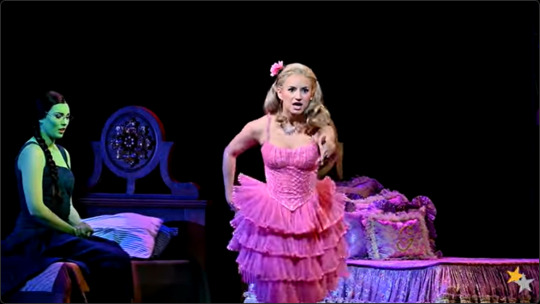
Final Thoughts
Popular is a popular song in the fanbase. It's an absolute bop, but it's also one of the simplest numbers in the entire production. The set is two beds, there is no fancy dancing, just one character sitting still and the other jumping around like she's on springs. The set doesn't change, there are no extra characters, nothing.
This song doesn't let anything distract from the character drama that is going on in centre stage, so that the audience can take in what is actually being said and done.
Next week, I am taking a look at I'm Not That Girl, and I will being going all in on the queer reading of this musical. Although, that is a heterosexual love song, right? How could that be queer? I have thoughts, so stick around if that interests you.
Previous - Next
(Images were sourced from this video)
#rants#literary analysis#literature analysis#character analysis#wicked is a queer story#wicked the musical#glinda upland#elphaba thropp#wicked musical#musical analysis#lgbtq#queer coding#lgbtqia#queer#gelphie
80 notes
·
View notes
Text
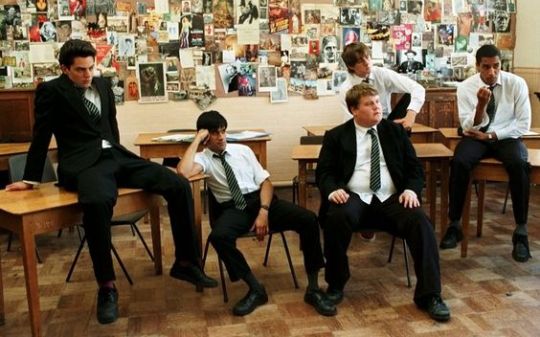
I appreciate and understand the love for Dead Poets Society in the Marauder-era fandom. The aesthetic is immaculate.
As a Brit and an older fan I would like to make a public service announcement that you're all sleeping on The History Boys. And would encourage everyone to go watch it.
#mauraders#wolfstar#the marauders#dead gay wizards#history boys#the history boys#marauder era#marauder coded#this film is a more accurate representation of the British school experience#plus it's a queer classic#the dialogue is *chefs kiss*#the performances are amazing#the references to art and film and music and literature are 10/10#public service announcement#alan bennett is incredible#give it a go#examines class and education in Britain#the film soundtrack is also amazing#is also more diverse than dead poets society
33 notes
·
View notes
Text
Forget about the "male gaze", let's talk about the "straight gaze"
Am I the only one who finds it weird that some people listens to 0 (zero) by LMYK, The case study of Vanitas' ending song, knowing that it's about Vanitas and Noé's relationship and still completely deny that the song could imply anything romantic?
Yet I'm 100% sure that if they listened to the song without any context attached to it they'll immediately categorize it as a romantic song
Or how they'll go through all of Seraph of the End manga and still think Yuu and Mika aren't in love with each other? Like we've read the same thing?? Have you seen the cheesy lovesick dialogues they've share through the whole story??
Note: I might be paraphrasing for some lines, but this lines are real, you can look them up
"I can keep going because you're here with me"
"I wasn't paying any attention because I couldn't look at anything but you"
"Yuu, the person I want to save the most is you" / "I know, you're also the one I want to save the most"
"My reason to live is being with Mika"
"Yuu, I love you"
"What I want for you is to save my heart"
"I don't wanna live in a world where you don't exist"
"Do you think he'll wake up if I kiss him?"
And I'll stop bc too many spoilers, but do you see what I'm talking about?
I could keep going with more examples but I'll stop here for my own sanity, like, am I going bananas? Am I going absolutely crazy?? I just can't imagine the mental gymnastics you have to do to deny of this, wtf?
#yami talks#queer#lgbt#mlm#queer coding#<< kinda#writing#literature#anime#manga#vanitas no carte#the case study of vanitas#vanoé#vanoe#vannoé#vanitas#noé archiviste#owari no seraph manga#owari no seraph#seraph of the end#ons manga spoilers#mikayuu#yuumika#yuumikayuu#mikaela hyakuya#yuuichirou hyakuya#ons#sote#vnc#lgbt in media
281 notes
·
View notes
Text
Mary Shelley thought she was slick by writing that Victor saw Henry as a brother as if they weren’t gay.
#literature#books#dark acamedia#frankenstein#henry clerval#victor frankenstein#mary shelley#queer coded#I will make everyting queer and no one can stop me
53 notes
·
View notes
Text
I ache to write an essay examining the queer approach to Sheridan Le Fanu's Carmilla compared to that of Moby-Dick, the former having long since been generally recognized as a homosexual story whereas the recognition of the latter is still dragging. However, creative time and energy is already insufficient as it is. 😩🏳️🌈
#moby dick#herman melville#literature#classic literature#carmilla#vampire#lgbtq literature#book characters#ishmael#queequeg#queer coding
8 notes
·
View notes
Text
#classic lit#classic literature#polls#queer coding#yes I did deliberately exclude les mis characters and achilles and patroclus#mainly because I know they’d sweep and i’m curious about *other* results#also if possible please try not to do the “op you forgot about x response#I only had ten options
52 notes
·
View notes
Note
'thinking about my pet student while staking the sexy girls' is bramiston being so closetedly queer
IT IS REALLY QUEER
Especially if you see Van Helsing's memorandum to Jack as a kind of analog to Stoker's unsent letter to Walt Whitman. Like the context is very different, but the sentiment is there.
I feel there is something to the hypnotism of the vampire ladies as well. Like, Van Helsing's reaction feels so repulsive instead of just that they were hot. He pathologizes his attraction to them. He sees them as other Lucys. He never even thinks about his wife in this scenario. But he thinks about Jack, about how his favorite student promised to give him all the support and encouragement he would need to complete such dirty work. And it soothes him.
#dracula daily#helward#abarham van helsing#jack seward#bram stoker#queercoding#i'm no expert on queer coding in literature so I hope someone else can write about this more#thebibi answers#thebibi on vampirez
69 notes
·
View notes
Text

In all her chaotic glory
Rich, opulent, affluent, wealthy,
They mean the same, they say
But no, not to her
Not to her tongue, that rolled around the letters
Not to her teeth that clenched at the stresses
Not to her lips the cuffed the words
In all her chaotic glory
She speaks to people with the same names
Listens to people of the same hearts
Taps her chin at people of the same faces
Narrows her eyes at people from the same places
In all her chaotic glory
She drapes her wrist over the fence
Pulses, throbs, thumps, and beats
Pounding in her heart, sensing a rustle, a flutter
She feels the veins behind her eyes aflame, alive;
hunting, prowling, sniffing for her muse.
Words from her lashes, dark as the moon’s shadow
Carve poetry-sweet nectar, stardust and words-
All conjured from the crevices of immortalized music,
Thumps of funeral beats,
Edges of flowers, vertices of tears
Shell of lips, curves of ears.
In all her chaotic glory
She watches, sees, observes, notices
The thrum of the hearth, echoes of the sea, the chambers of your soul
The god in your eyes
(poem is by me. pics are not)
#dark academia#chaotic academia#poetry#literature#queer coded literature#muses#aesthetic#collage#books#aesthetic moodboard#the secret history#cosmic
34 notes
·
View notes
Text
there is a distressing lack of fanfiction for classic literature. please let me uwu-ize and babygirl the characters in my English assignments so I can find a reason to keep living
#is it so much to ask#i just want gay fanfiction for shit like one flew over the cuckoo's nest#i mean#harding is CLEARLY queer-coded okay#you can't tell me that a closet fanfic of him hiding from the nurse wouldn't be both fantastic and kind of on the nose right#please note that i am somewhat joking#I swear#I promise I'm not this disturbed#fanfic#fanfiction#classic literature#classic#writing#books#books and libraries#reading#for your consideration#shitpost#please don't take me seriously#one flew over the cuckoo's nest#gay#queer#lgbtq#lgbtqia#gay fanfiction#stupid humor#how many tags is too many tags#what am i doing with my life#english#language arts
38 notes
·
View notes
Text
So in regards to todays Dracula Daily (May 16)…
How y’all feeling about:
“Then the Count turned, after looking at my face attentively, and said in a soft whisper:—
"Yes, I too can love”
Because I’d like y’all to visualize that and then still tell me you’re feeling normal about it.
Dracula tells the women they are not to touch Jonathan and he’s Angry about them attempting to. Them they say Dracula cannot love, then let out a horrible “soulless laughter”. The Count drops from the commanding yell to look down “attentively” at Jonathan’s face for a moment then casts his gaze back towards the women and now in a fucking whisper says, “Yes, I too can love.”
Is that not the most fucking sad romantic shit ever!! He was furious at them for laying a hand on Jonathan then at the claim that his feelings for Jonathan don’t exist he just falls down to a whisper to bare what’s left of his damned soul?
#I experienced reading that for the first time almost exactly a year ago#and lord did it affect me#literally ended up writing two essays involving queer coding in Dracula because of it#anyway enjoy the possible pain I inflicted by posting this#rambling in the tags#dracula daily#daily dracula#dracula#gothic lit#gothic literature
117 notes
·
View notes
Text
What Do I Want?
Wicked has a thing with dreams.
The land of Oz is a land of fantasy. I mean this in the sense that it isn't exactly non-fiction, but its also a place where dreams come true. This is a place and a story in which if you wish really hard, good things can happen.
But Oz was never what it seemed, and where the original The Wonderful Wizard Of Oz used smoke and mirrors for a big reveal towards the end of the story. Wicked leans much further into deceit and scheming to lean into its theming, and that is set up in The Wizard And I.
Let me explain.
SPOILERS AHEAD
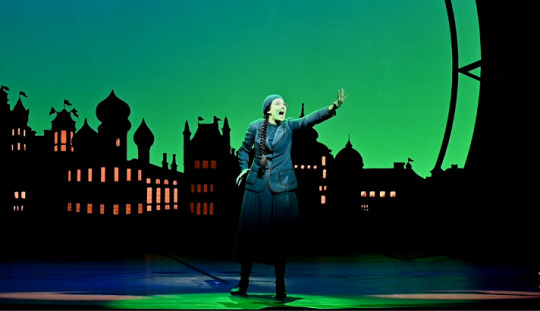
A key part of storytelling is making the lead character empathetic or understandable. It isn't essential (Watch Deathnote for a good counter example), but it is a strategy for getting the audience invested. In musicals, where most important plot beats are sung, this often takes the form of an "I want" song that establishes quickly and efficiently the goals of the protagonist. Think Part Of Your World from The Little Mermaid for an example.
The Wizard and I is Elphaba's "I want" song, and that honestly made this post rather difficult to write. Because I don't think that's an unobvious take and I wanted to do something out of the ordinary. But I think Elphaba's song is fascinating because of how it subverts the premise.

Wicked is a satire, and the key to writing good satire is to understand the core text and tropes and to take them both in a wildly different direction. Most notably, Elphaba is on the verge of getting what she wants. This isn't an "I wish I could", it's a "this is what I'm going to get", and because this is a story about dreams colliding with reality, which sets up that theme rather neatly.
The plot of Wicked centres around the falling apart of Elphaba, and the breaking down of her ambitions. But it is a story about hope throughout, and I think it is important to set up how relentlessly hopeful she is.

Although, Elphaba's hopefulness is in direct contrast with the rest of her demeanour. Once again, the theme of deception is on display, this time through her false face. She has to please everyone, especially her father, so she puts on an incredibly restrained and abrasive personality. But what she wants truly is to be "unlimited".
Don't get me wrong, Elphaba is abrasive, and that's not a flaw, she's just not that social. What I'm saying is that there is a difference between being awkward and actively pushing people away. Elphaba does the latter to disguise from her true self.

"Unlimited
My future is unlimited."
I have extremely limited musical knowledge here, so bear with me. There is a key change here, to sell the importance of this line, because it keeps coming up. I will point it out when it comes to it. But the change from A Flat Major (should I use the flat symbol here? I have no idea) to G Flat Major emphasises that this is the point of the song. If I've got those keys wrong, please tell me.
Everything else is superficial. When boiled down to it's barest principles, Elphaba wants to be free. To be free from prejudice and expectation, and she spends the rest of the show achieving this. She defies gravity, free from the laws that keep her down; she defies death and lives her own happy ending; and she defies the wizard to pursue her own path.

I watched Wicked live in Sydney, and I am using the official video from that show of this song as images. What is interesting there is how Sheridan Adams, who played Elphaba in that show, chose to act out that character.
She became slowly more expressive throughout the course of the song, starting very closed in and spotlit against a background that couldn't help but contrast with her appearance. But she got more relaxed and more open with the audience as she sang, realising she was finally getting what she wanted.
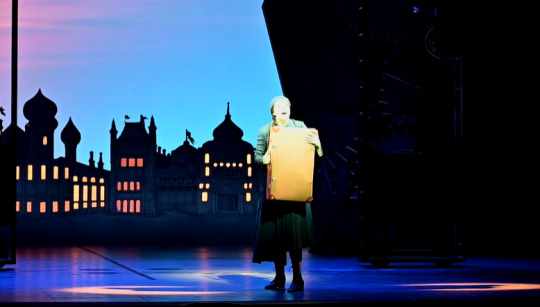
And as she sang, the world changed, with the sky going from the sunrise of the opportunity to the bright day of a new world, to a green tint to match Elphaba, letting her still stand out. But now she isn't a sore thumb, she belongs in the world and is free to do whatever she wants. As she gets freer, the world becomes hers to explore.
It's also notable that as Elphaba imagines more, and as she continues to hope, the set opens up. No longer is she boxed in by the school, now the world is her oyster.
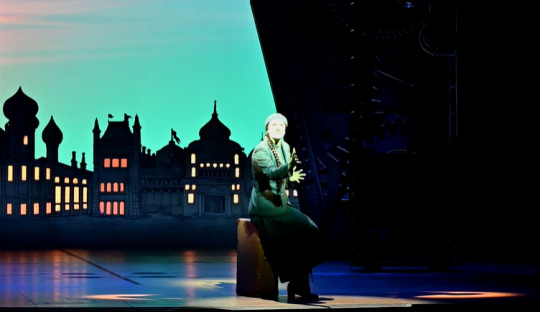
But that isn't the only recurring theme set up by this song.

These notes form a motif that comes back in Dancing Through Life. Specifically, from Galinda, when she is falling in love with Fiyero after decieving Boq into dancing with Nessarose, and again when she and Nessa retrospect about those relationships. The flourishes are different, but the core pattern is the same.
"Help me meet the wizard"
"We deserve each other."
Neither of those two relationships work out, by the way, because everyone involved was deceived in some way. They all thought the relationships would work out in different, contradicting ways.
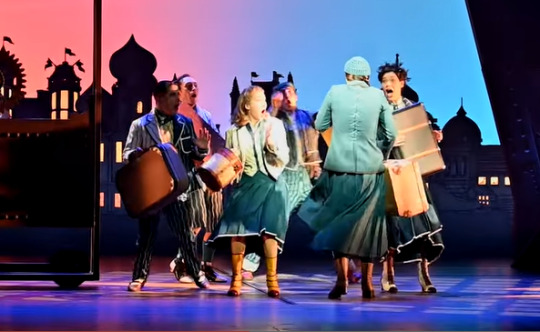
I'm not going to go into too much detail on that song here, as this is a post about The Wizard and I, but it's interesting that a motif with themes of deception, false beliefs and and misguided aspirations, gets used for Elphaba's most achievable goal. She wants to meet the wizard, why is that misguided?
Well, because the wizard isn't what he says he is. He cannot do any of the things Elphaba hopes he can be. The plot twist of the original story becomes central to this one in a much more psychological way. Elphaba has pinned all of her hopes on something, and the music is telling you from the start that this isn't going to work out.
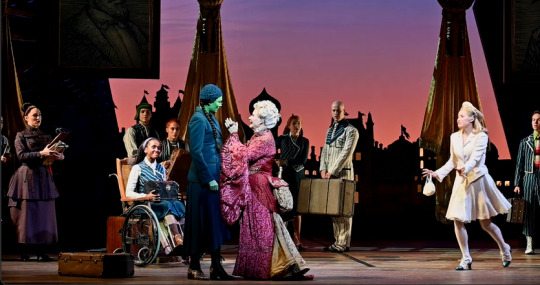
The song also tells you through the lyrics.
"If you work as you should
You'll be making good"
First up, conditional acceptance. Not what Elphaba is after, but she's at such a low point in terms of belonging that this is enough to sway her. This is a fault that she gets over. She doesn't want the bare minimum; she wants what everyone else has. To be unlimited.
There's also the fact that the opening of the musical, No One Mourns the Wicked, went out of its way to break down the concepts of good and evil in this world. The story reenforces this with Wonderful later, but here it comes up and Elphaba accepts it uncritically.
But whose definition of "good" is Morrible using here. Good for whom?

So, here is where my reading of the story as a whole comes in. I will elaborate further when we get to it later on in the musical. But, in my opinion, this is a fundamentally queer coded story.
Elphaba is born different, outside of the norm of her society. All she wants is to be unlimited, for people to not see her and have their minds filled with prejudice.
I brought up Part Of Your World earlier, because the queer theming there is all but explicit, but The Wizard and I has this coding in spades. Obviously, being green is something that others her, and something she wants "cured", only to find that people like her for it, or like her for other reasons and the greenness is just who she is. She can't and shouldn't change it.
But, an angry mob is an angry mob, and people are small minded. People see something they don't understand and cast it as a villain for their own narratives.
Alternatively, she gets told that she can be accepted despite being green, if she contributes to society in the way that the leadership wants her to. Her personhood is contingent on her usefulness, rather than being assumed like everyone else.

Let's, talk about me for a second. I am a queer individual. I am neither heterosexual nor cisgender, and I can definitely empathise with Elphaba here. I have felt that same antipathy towards me for something I could not control, and I have wished that I could be "normal". I have definitely been given that "contribute to society" ultimatum.
But as I have matured, I have learned to respect myself enough to understand that these are parts of who I am, and that I am deserving of respect and dignity just as much as anyone else.
All people are deserving respect, queer or otherwise, and those that take issue with that are the problem, not us. I hope that one day, all of us can feel free to be who we are.
One day, we will be "unlimited".

Final Thoughts
The Wizard and I is my second favourite song in the musical, and I will reveal my favourite later on. But its fascinating how much setup this song does for the worldbuilding of Oz.
The audience gets told just how powerful everyone thinks the wizard is, and even if you know the plot twist, you empathise with Elphaba after the betrayal because you have seen how much of her heart gets put into this.
This is part two of a series on Wicked, with part three coming next week, centring around What Is This Feeling and continuing with the queer analysis of this very queer musical. So, stick around if that interests you.
Previous - Next
#rants#literary analysis#literature analysis#character analysis#wicked the musical#wicked#wicked musical#elphaba thropp#wicked is a queer story#the wizard and i#musical analysis#lgbtqia#queer coding
35 notes
·
View notes
Text
If anyone is looking for a good movie to watch or a new fandom to join, I think you should watch Dead Poets Society. There is defiantly NOT an easily searchable vimeo link of the movie out there... ;)
#pls just watch it#if ur a literature nerd dark academy fan or like the mauraders u will like it I swear#movies#movie recommendation#fandom#it's sad but rlly good#shakespeare tragedy level ending but that's what fix it fics are for 🫶#pls babes pls I beg of thee#it's also queer coded as shit
3 notes
·
View notes
Text
Really cool of me how I spent an hour ranting about the left hand of darkness to my friend and said really normal and average things like "Genly is really sexist but it's the internalized transmisogyny and he's working on it" and "he told his boss they didn't fuck in that tent but he also said he was a liar so" and "I cannot explain shifgrethor to you in the same way I can't explain gender to you. What's a woman Ai? No fucking clue, what's shifgrethor Harth? If you know you know, you know?" I'm very normal about this book from 1969
#jonay analyzing classic literature like it's a modern queer coded tv show#no but I'm very serious about the transfeminine/nonbinary reading of Genly and this book in general I have Opinions#you think if next year I take postmodern literature in usa they'll let me write a paper on this because#tlhod#the left hand of darkness#book shitpost#also I don't consider this classic literature but it fits the vibe of the tag so
50 notes
·
View notes